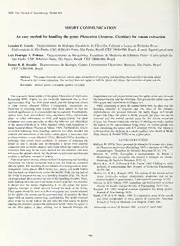
An easy method for handling the genus Phoneutria (Araneae, Ctenidae) for venom extraction PDF
Preview An easy method for handling the genus Phoneutria (Araneae, Ctenidae) for venom extraction
: 2008. The Journal ofArachnology 36:604-605 SHORT COMMUNICATION An easy method for handling the genus Phoneutria (Araneae, Ctenidae) for venom extraction Leandro F. Garcia: Departamento de Biologia, Faculdade de Filosofia, Ciencias e Letras de Ribeirao Preto - Universidade de Sao Paulo, USP, Ribeirao Preto, Sao Paulo, Brazil. CEP 14040-900, Brazil. E-mail: [email protected] Luiz Henrique A. Pedrosa: Departamento de Bioquimica, Faculdade de Medicina de Ribeirao Preto - Universidade de Sao Paulo, USP, Ribeirao Preto, Sao Paulo, Brazil. CEP 14040-900, Brazil Denise R. B. Rosada: Departamento de Biologia, Centro Universitario Claretiano. Batatais, Sao Paulo, Brazil. CEP 14300-000, Brazil Abstract. This paperdescribesan easy, cheap, and safemethod ofcapturingand handlingthemedicallyimportant spider Phoneutria for venom extraction. The method does not injure or kill the spider and allows the extraction ofpure venom. Keywords: Armed spider, venomous spiders, vivarium Thevenomousctenidspidersofthegenus Phoneutria(P. nigriventer longitudinal slit and pusheddown onto thespiderin thearea between Keyserling 1891) (Figure la) are medically important due to their the cephalothorax and the abdomen. This presses the spider onto the aggressiveness (Fig. la), their great speed, and the dangerous effects filter paper and immobilizes it (Figure lc). of their venom (Bticherl 1953a). Consequently, researchers are While continuing to press the animal down with the glass rod, the interested in obtaining pure venom from these spiders so that the handling chamber is removed and the sides of the animal’s medical significanceofitscomponentscan beexplored. Traditionally, cephalothorax are grasped between the index finger and thumb spiders have been immobilized using anesthesia (CGj, chloroform, (Figure Id). Once the spider is firmly grasped, the glass rod can be ether, or other substances) or with cold temperatures, but these removed and the animal carried away for the venom extraction techniques can cause mortality or alter the behavior and physiology (Figure le). Venom extraction consists of placing electrodes against of the animal (Harris et al. 1965; Randall 1982), with immediate or the region of the cephalothorax lying above the venom glands and latent harmful effects (Nicolas & Sillans 1989). Furthermore, venom then stimulating the spider with 6 V (Biicherl 1953b). The venom is extraction following these handling methods has often entailed the collected from the chelicera in a small capillary tube (Smith & Micks excision and maceration ofthe entire venom gland, a procedure that 1968; Morris & Russell 1975) or on a glass plate. produces impure venom (Biicherl 1953a). Biicherl (1953a) describes a LITERATURE CITED technique that avoids these problems. It consists of irritating the spider so that it attacks and envenomates a device (two pipettes Biicherl. W. 1953a. Novo processo deobtengaodeveneno seco, puro, connected with an elastic surgical tube) from which thevenomcan be dePhoneutrianigriventer(Keyserling, 1891)etitulagaodaLD50em extracted. This may be the safest method for the extractor and does camundongos. Memorias do Instituto Butantan 25:153-174. notcausetheanimal’sdeath, buttheprocessislaboriousanddoesnot Biicherl, W. 1953b. Escorpioes e escorpionismo no Brasil. I. produce a sufficient amount ofvenom. Manutengao dos escorpioes em viveiros e extragao de veneno. Hereweproposean easy, cheapmethod forcapturingandhandling Memorias do Instituto Butantan 25:53-82. Phoneutria for venom extraction that is safe for both the extractor Harris. R.L., R.A. Hoffman & E.D. Frazar. 1965. Chilling vs. other and the spider. The handlingdeviceconsists ofa transparent orsemi- methods of immobilizing Hies. Journal of Economic Entomology transparent 2-liter plastic (PET) bottle (i.e., empty soft drink bottle) 58:379-380. that has been cut transversely across the middle. Only the top halfof Morris, J.J. & R.L. Russell. 1975. The venom of the brown recluse the bottle is retained for use as a handling chamber (Fig. lb). An 8- spider Loxosceles reclusa composition, properties and an im- cm longitudinalslit iscut intothesideofthehandlingchamber. Then, proved method ofprocurement. Federation Proceedings 34:225. while holdingonto thetopofthebottlemouth (with lid), thechamber Nicolas, G. & D. Sillans. 1989. Immediateand latenteffectsofcarbon is placed over the spider, imprisoning it. At this point, the spider dioxide on insects. Annual Review of Entomology 34:97-116. typically attempts to climb upward toward the neck of the bottle. Randall, J.B. 1982. Surgical restraint apparatus for living spiders. Filter paper should be used as a floor to capture any venom released Journal ofArachnology 10:91. by the spider; the venom can be recovered later by washing the filter Smith, C.W. & D.W. Micks. 1968. Acomparativestudy ofthevenom paper with an organic solvent (e.g., acetonitrile). The spider is forced and other compounds of three species of Loxosceles. American away from the bottle wall or lid and onto the filter paper by gently Journal ofTropical Medicine and Hygiene 17:651-656. tapping the chamber against the extraction bench. Once the spider is on the filter paper, a glass stirring rod is inserted through the Manuscript received28 October2007, revised 17 April2008. 604 GARCIA ET AL.—METHOD FOR HANDLING PHONEUTRIA 605 Figure I. -The step-by-step handling method forvenom extraction ofPhoneutrianigriventer. a. The spider in an aggressive position; b. Left side ofan empty 2-liter plastic bottle and right side ofa bottle with a transverse cut and a glass stick inserted in the perpendicular cut; c. The trapped animal in the bottle being immobilized with the glass stick; d. Grasping the spider with fingers; e. Spider ready for venom extraction.
